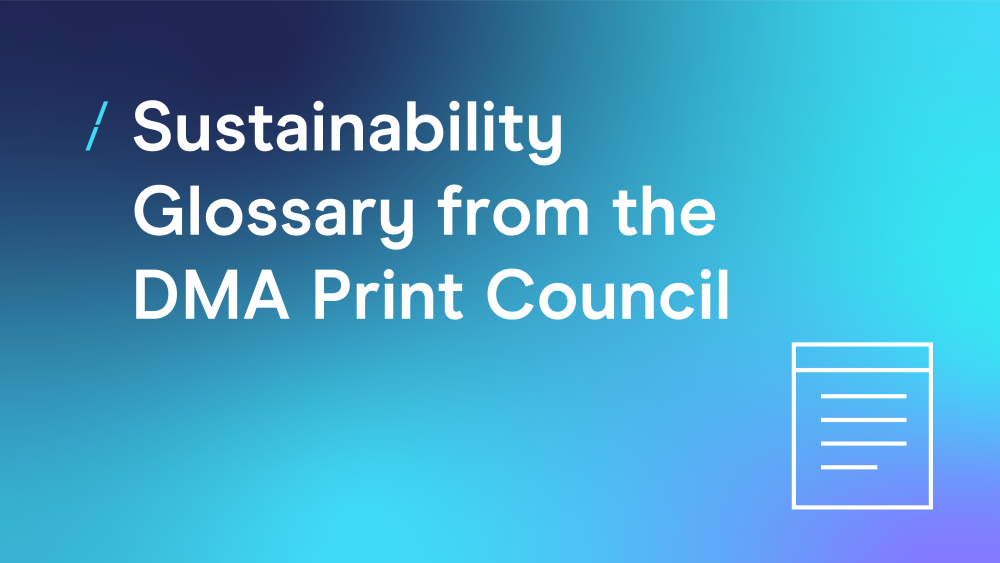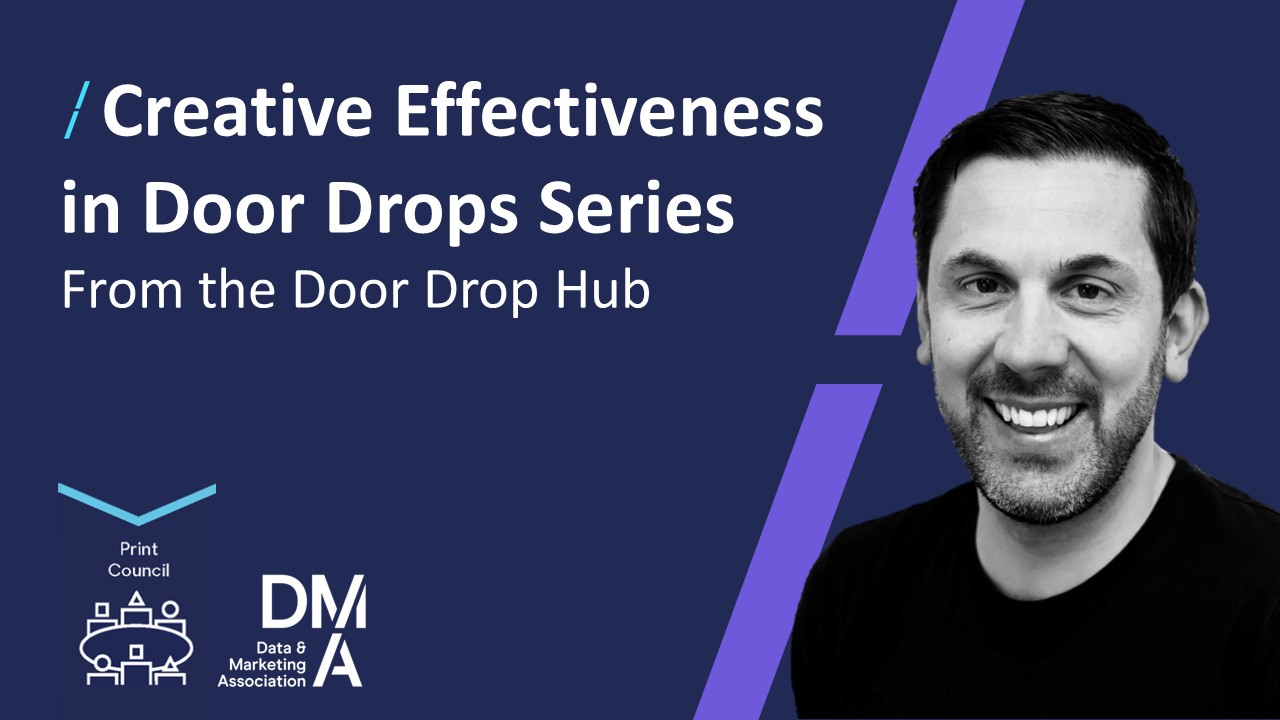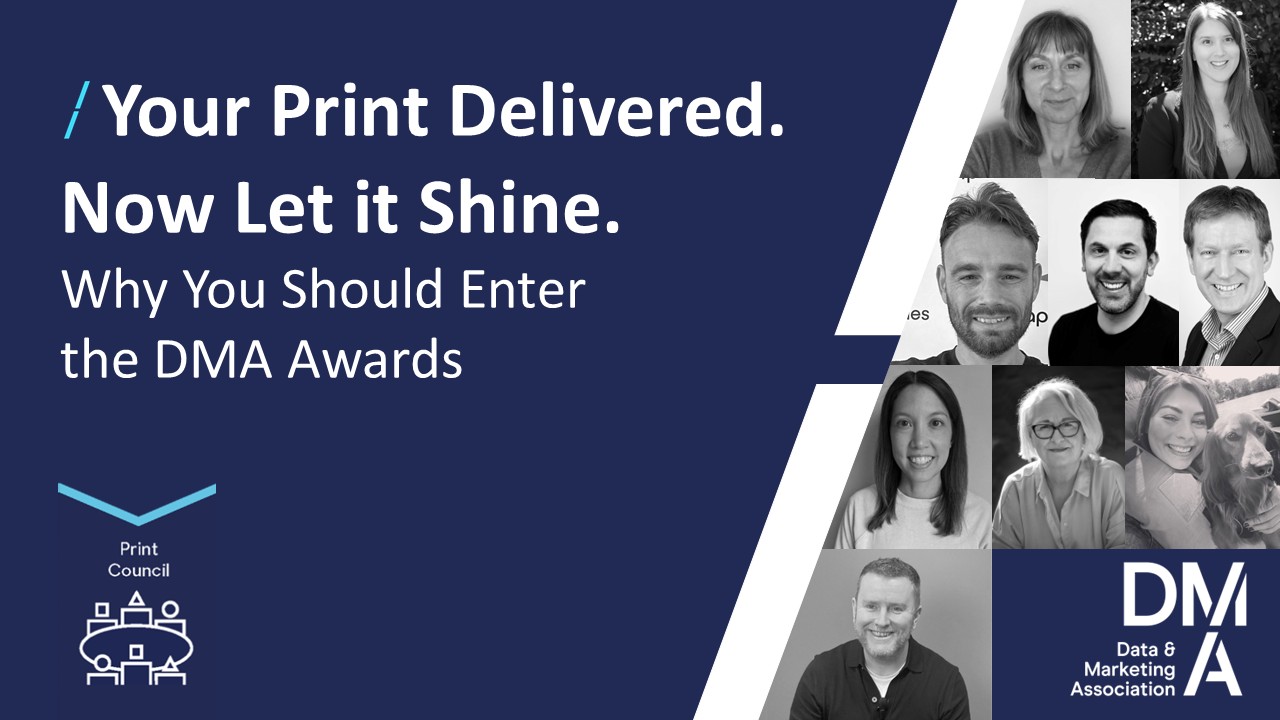Sustainability Glossary from the DMA Print Council
11 Feb 2022

This article was written by the Sustainability hub of the Print Council.
There are many terms that surround sustainability, which can be confusing. The Print Council has shared the terms they think are important to understand as part of the process of becoming more sustainable. The Council has also shared a series of links to sustainability projects within the print industry that are worth keeping an eye on and will provide support with no matter what progress towards sustainability you have made. This list will be regularly updated so don’t forget to check back in.
If you have any questions or feedback, please get in touch at councils@dma.org.uk.
Glossary Terms
- Carbon Balance
- Carbon Balancing is where the carbon impacts of a product or service have been estimated and an equivalent amount of carbon dioxide is either prevented from being released into or is absorbed from, the atmosphere.
Source
- Carbon Balancing is where the carbon impacts of a product or service have been estimated and an equivalent amount of carbon dioxide is either prevented from being released into or is absorbed from, the atmosphere.
- Carbon Neutral
- When a person, company or country says they are “carbon neutral”, it means they’ve reduced the amount of carbon dioxide they’re responsible for releasing into the Earth’s atmosphere, as much as they can. And for the part that’s left, they’ve used carbon offsetting.
Source
- When a person, company or country says they are “carbon neutral”, it means they’ve reduced the amount of carbon dioxide they’re responsible for releasing into the Earth’s atmosphere, as much as they can. And for the part that’s left, they’ve used carbon offsetting.
- Carbon Negative
- The reduction of an entity’s carbon footprint to less than neutral, so that the entity has a net effect of removing carbon dioxide from the atmosphere rather than adding it. Becoming carbon-negative requires a company, sector or country to remove more CO2 from the atmosphere than it emits. (Also referred to as “Climate Positive”)
Source
- The reduction of an entity’s carbon footprint to less than neutral, so that the entity has a net effect of removing carbon dioxide from the atmosphere rather than adding it. Becoming carbon-negative requires a company, sector or country to remove more CO2 from the atmosphere than it emits. (Also referred to as “Climate Positive”)
- Carbon Offsetting
- Carbon offsetting is compensating for carbon emissions by funding projects that have a positive environmental impact elsewhere, for example in reforestation programs or investing in renewable energy in developing countries. In theory, we’re ‘carbon repairing’ what we have ‘carbon damaged’.
- Carbon Footprint
- The amount of carbon dioxide released into the atmosphere as a result of the activities of a particular individual, organization, or community. Specialist companies or online tools can be used to calculate the carbon footprint of an activity.
- FSC/PEFC
- FSC ® is an international non-profit, multi-stakeholder organisation established in 1993 to promote responsible management of the world’s forests. The FSC logo when used on paper and printed products is assurance that it is made with, or contains, wood that comes from FSC certified forests or from post-consumer waste. Source
- PEFC ™ is an independent, non-profit, non-governmental organisation, founded in 1999 which promotes sustainably managed forests through independent third-party certification. The PEFC logo provides an assurance to purchasers of paper products that the wood fibre originates from PEFC certified, sustainably managed forests.
Source
- Greenwash
- Greenwash is defined as “Behaviour or activities that make people believe that a company is doing more to protect the environment than it really is”, (Cambridge Dictionary) or, “Disinformation disseminated by an organisation so as to present an environmentally responsible public image.” (Wikipedia
- Many organisations are urging their customers to go paperless with claims that going paperless saves trees, is “greener” and better for the environment.
- These statements are Greenwashing. These statements are not specific, not supported by reliable scientific evidence or relevant life cycle analysis and are misleading. Without evidence to support the claim being made such communication is Greenwashing and contravenes advertising regulations in most European countries.
- In the UK, The Competition and Markets Authority (CMA) has recently published the “Green Claims Code” to help businesses comply with the law.
- Advice and information sheets have also been published by Two Sides.
Please click here for a detailed glossary of terms:
- CEPI Glossary
- Two Sides Myths and Facts (Page 18)
Other Useful Projects to be aware of:
Print Specific
- TwoSides - an initiative by companies from the graphic communications supply chain. They have a common goal to promote the sustainability of the graphic communications supply chain and dispel common environmental misconceptions.
- Love Paper - consumer campaign to raise awareness of print sustainability.
- Postage discounts from Royal Mail – the current sustainability specification is being reviewed for use in early 2022.
Business/General Sustainability
- Race to zero - UN-backed global campaign to rally non-state actors – including companies, cities, regions, financial and educational institutions – to take rigorous and immediate action to halve global emissions by 2030.
- B Corp - Certified B Corporations are businesses that meet the highest standards of verified social and environmental performance, public transparency, and legal accountability to balance profit and purpose.
- Government updates
- LEPs Grants - government grants to support local areas
Advertising/Marketing Industry Sustainability
- Ad Net Zero - The Advertising Association’s initiative to achieve net zero for the whole advertising industry by 2030.
- Change the brief - #ChangeTheBrief Alliance is a partnership between agencies of every size and type – media, creative, design, PR – and their clients, learning and acting together to directly address the challenge of the climate crisis by promoting sustainability via every channel available to them.
- IPA Media Futures Group’s Climate Charter - an initiative to provide media agencies with the tools and resources to support their transition to a zero-carbon future.
This article was written by the Sustainability hub of the Print Council. The hub aims to champion new ways that the industry is creating to support sustainable print media. The hub focuses on positive and educational messaging around the practical elements and procedures needed for sustainability.




Please login to comment.
Comments